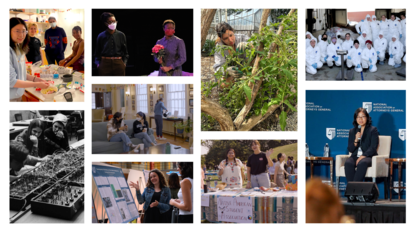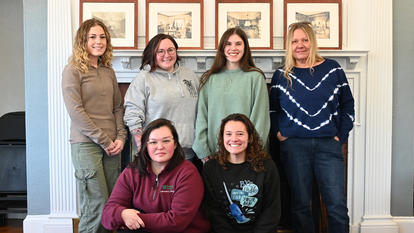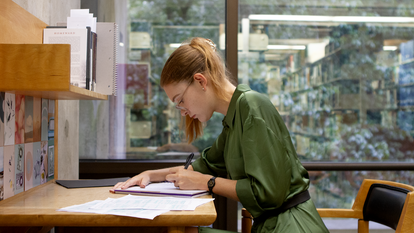Wellesley Students Bring Home Ideas for Change after Wintersession Civil Rights and Immigration Trips

Transformative. Intense. Beyond words. These are some of the ways Wellesley students described two Wintersession alternative break programs co-sponsored by the Office of Religious and Spiritual Life and the Office of Intercultural Education: one to Southern states that was focused on civil rights issues, and the other to the Arizona-Mexico border that focused on immigration.
The programs let students “explore how diverse faiths inform how communities organize social justice movements,” said Amira Quraishi, Wellesley’s interim dean of religious and spiritual life and Muslim chaplain.
Students met with activists and community organizers, visited memorial sites, and walked either the very streets civil rights leaders once marched on or the desert paths migrants cross every day.
After they returned to Wellesley for the spring semester, students found the Wintersession experiences stayed with them, inspiring a deeper understanding of critical issues, new ways of thinking about how best to serve one’s community, and for some, goals for future internships and studies. For example:
- A meeting with the Montgomery, Ala.-based Equal Justice Initiative deepened first-year Sarai Hertz-Velasquez’s interest in mass incarceration. She will be an intern this summer with PEN America in their Prison and Justice Writing program.
- Shelby Kranc ’19 says a visit to Selma, Ala., where students met activist Joanne Bland, a participant in the Selma march and the youngest person to have been jailed during the protests of the 1960s, showed her new connections between past and present youth activism. As a high school educator, Kranc plans to “give students a voice in the classroom” and encourage them to “stand up for what they believe in.”
- Briana Vigil ’22, who went on the border trip, is currently pre-med and would like to help treat migrants who become ill or dehydrated on their journey. In the wake of her Wintersession experience, she has considered majoring in peace and justice studies or political science in order “to be in a position where I can create better policies.”
Participants from both programs saw parallels between justice struggles in different places and times, and were inspired to commit to social change, whether large or small. Soumaya Dammak ’22, for example, went on the civil rights trip. She is from Tunisia and was 11 when the Arab Spring led to the overthrow of the country’s president, Zine El Abidine Ben Ali, and the establishment of free elections. She described the importance of prioritizing social transformation now: “If every generation waits for the following generation to make a change, the change will never happen. Every one of us can fight for social justice and contribute to change, regardless of one’s course of study, or career path.”
The trips also led students to reflect on the role of spiritual beliefs. For Sara Clark ’22, “the commonalities between other faiths and my own” inspired “a new passion for understanding the differences between faith practices.”
She said traveling to Memphis, Birmingham, Montgomery, Selma, and Atlanta also “radically changed” how she defines service and leadership: “My thought process in regard to social change has transformed from questioning what I can do to help, what ideas and skills I can contribute, to seeking to understand the needs of others.”
In Tucson, Ariz., and Nogales in Sonora, Mexico, hosted by BorderLinks, students met with activists, migrants, and scholars, and attended immigration court proceedings at the Tucson federal courthouse. They also walked through the desert landscape, witnessing first-hand some of the effects of militarization at the border.
“We saw bullet shells, cans, torn pieces of clothing, backpacks, debris, Border Patrol tire tracks, things that don’t belong in the desert,” said Nallely Esparza ’21.
To inspire awareness and action among the wider Wellesley community, students from the Arizona-Mexico program organized a short presentation about their experiences followed by a screening of the film, “Undeterred: Community Resistance on the US/Mexico Border”. They also created an art installation in the Lulu Wang Campus Center. Photographs captured desert scenes, and cut-out butterflies, each signifying 10 reported migrant deaths, wound around the building’s central staircase from the first to the fourth floor.
Photo: Students on the Arizona-Mexico border trip walked the same trails immigrants take to cross into the United States.



